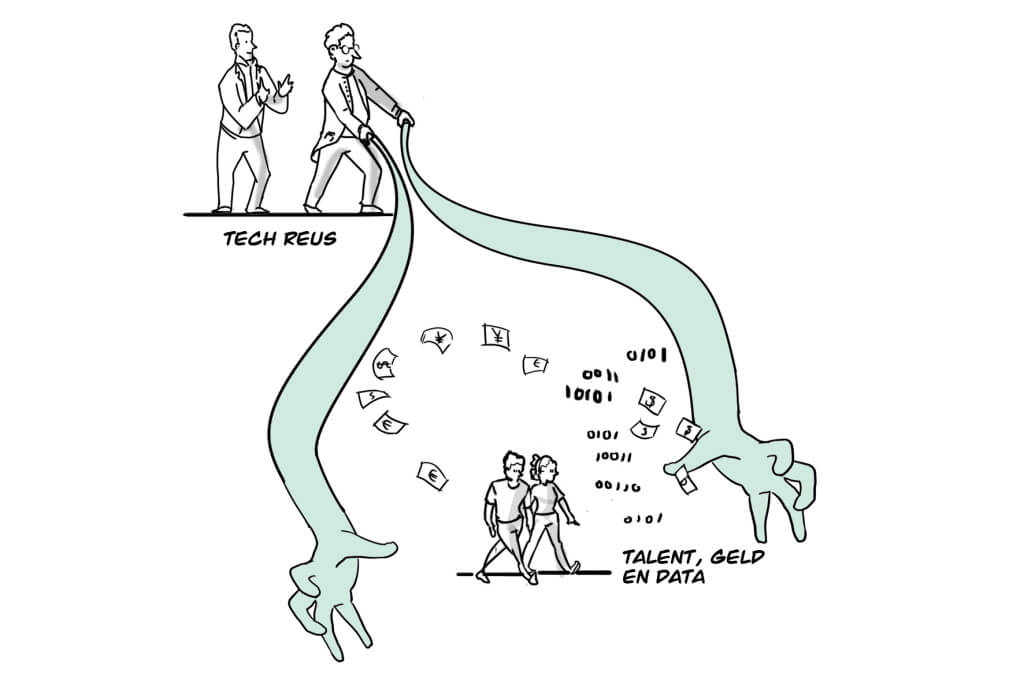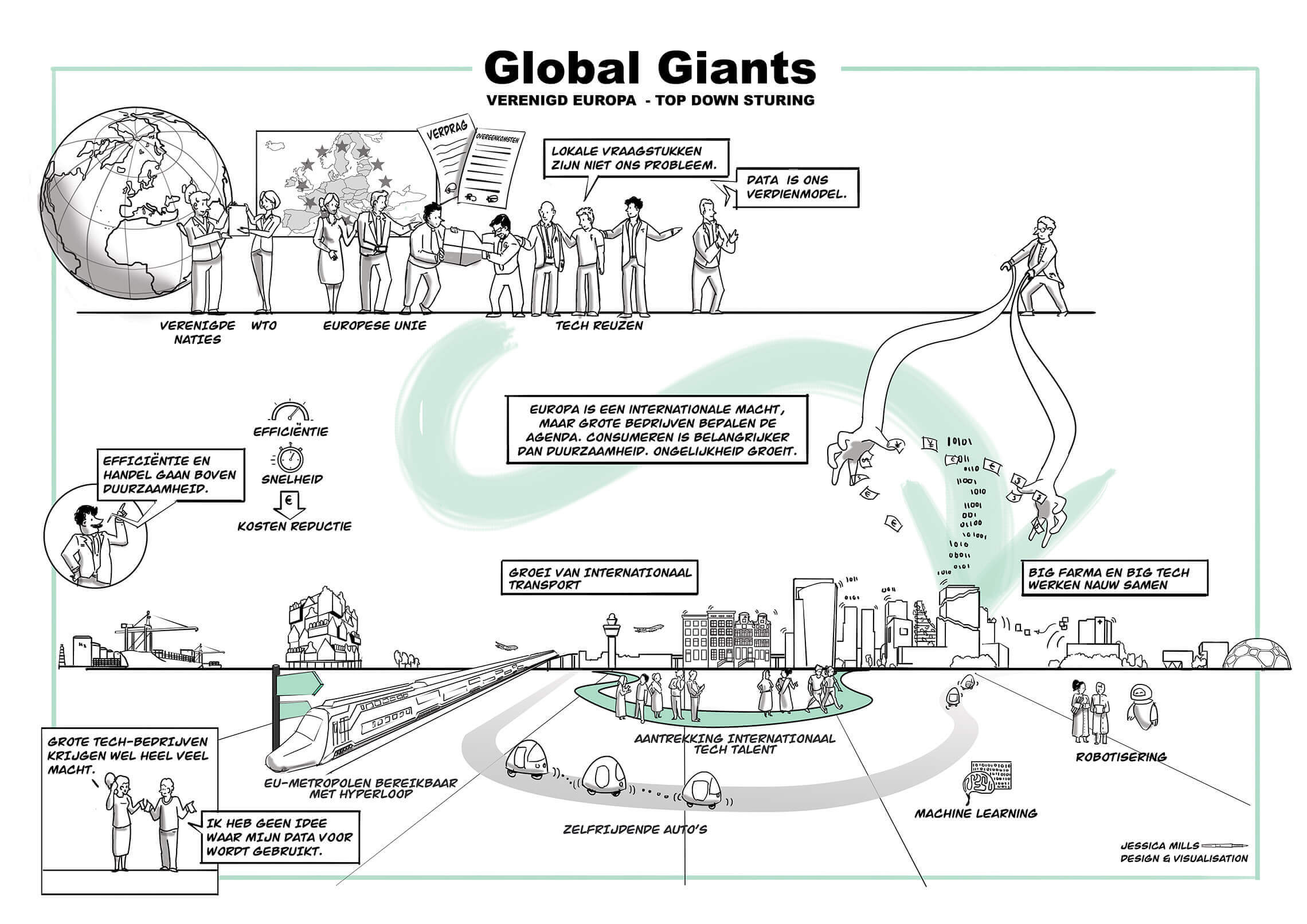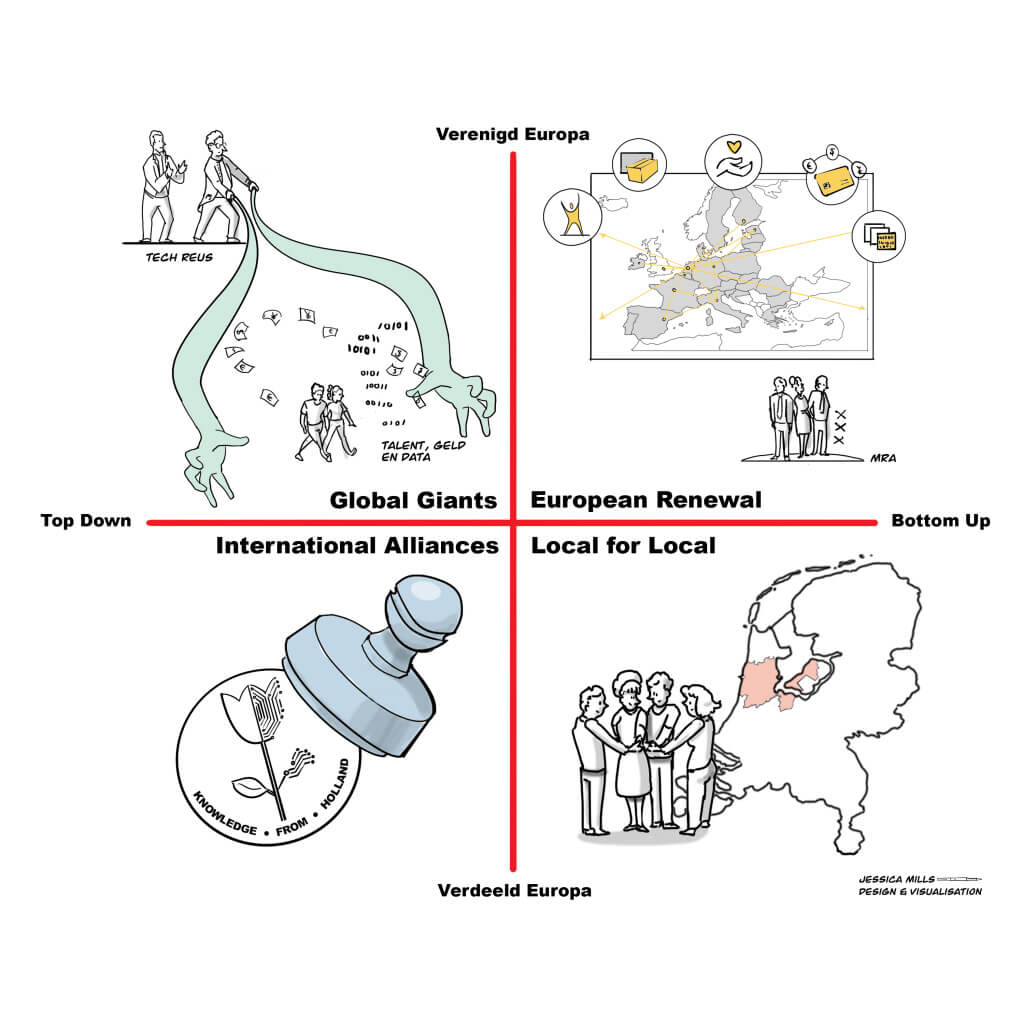Scenario: Global Giants
In het scenario Global Giants is de sturing top-down georganiseerd en Europa sterk verenigd. Dat betekent een wereld van grote multinationals, de global giants, die veel macht hebben. Marktdenken staat centraal, het sterke Europa richt zich vooral op economische groei om mondiaal te blijven concurreren. De laatste update van dit scenario was op 9 juni 2020.

Kernwoorden bij dit scenario:
- Competitie
- Efficiency
- Consumeren heeft de prioriteit
- Mondiale, vrije markt
- Europa als internationale kracht
Hieronder zie je onze praatplaat voor het scenario Global Giants. Elk scenario heeft zo’n plaat (onderaan dit artikel vind je de links naar de andere drie scenario’s), waarin de verschillen tussen de scenario’s en belangrijke elementen van elk scenario scherp gevisualiseerd zijn. Samen met de tekst hieronder krijg je zo snel een indruk van de wereld die bij elk scenario hoort.

Verenigd Europa, top down sturing
Globalisering 2.0
Het is 2040. De wereld is in rustiger geopolitiek vaarwater gekomen na een periode van onrust en dreigend protectionisme. Globalisering en vrijhandel staan centraal. Goederen, ideeën, kapitaal en talent bewegen zich vrij over landsgrenzen in een hypercompetitieve wereldeconomie. Meer dan ooit zijn landen door middel van handel en concurrentie om talent economisch met elkaar verbonden. Grote bedrijven met financiële reserves, schaalvoordeel en ‘just in case’ voorraden op strategische plekken zijn het sterkst. Big Tech beheert een groot deel van de wereldwijde data en communicatie. Multilaterale organisaties, zoals de VN en de WTO, hebben een belangrijke rol en zorgen voor gunstige randvoorwaarden. Marktdenken, waarde voor aandeelhouders en economische groei staan centraal.
Verenigd EU zet door op level playing field
Europa is verenigd. Door gezamenlijk optrekken van lidstaten kan Europa een politieke en economische rol van betekenis spelen op wereldniveau. Er wordt volop samengewerkt. Er is overeenstemming over de interne markt en op diverse vlakken zijn regels en standaarden geharmoniseerd. Europese bedrijven worden waar mogelijk beschermd tegen vijandige overnames. Europa zorgt ervoor dat goederen voor vitale processen als gezondheidszorg of energievoorziening in geval van nood op eigen bodem geproduceerd kunnen worden. Brussel ziet toe op een level playing field en kan in dit mondiale speelveld haar eigen wensen rondom een schone en inclusieve economie overeind te houden. Mondiaal competitieve stadsregio’s, zoals de Metropoolregio Amsterdam, gaan onderling de concurrentie aan om bedrijven aan te trekken.
Wat betekent dit voor de Metropool Amsterdam?
We werken aan een slimme, groene en gezonde metropool van de Toekomst. In het scenario Global Giants is er een aantal krachten die daarbij helpen. Tegelijkertijd zijn er ook bedreigingen. Wat moeten en kunnen we doen om in dit scenario de juiste stappen te zetten?
Technologische revolutie met winstoogmerk
De combinatie van geharmoniseerde internationale standaarden met vrijhandel zorgt voor een optimaal klimaat voor baanbrekende technologieën. Europa nodigt de grote bedrijven uit om gezamenlijk innovatiemissies te formuleren, waarop zij vervolgens haar innovatiefondsen en de fondsen en maatregelen uit de Green Deal richt. Bedrijven investeren sterk in de inzet van nieuwe technologie. De sprongen op het gebied van robotisering, kunstmatige intelligentie en machine learning, blockchain, nieuwe productietechnieken en hightech materialen zijn haast niet bij te benen. De technologische revolutie levert veel voordelen op voor gebruikers, maar heeft ook gevestigde businessmodellen, sectoren en waardeketens opgeschud: van de logistiek tot en met de zakelijke dienstverlening en financiële sector. Al deze innovatie staat in dienst van efficiëntie, snelheid en kostenreductie. De maatschappelijke bijdrage en sociale impact die technologie kan leveren is voor bedrijven van ondergeschikt belang.
Technologische ontwikkeling is leidend, en wordt als het economisch aantrekkelijk is of met behulp van subsidies gebruikt om stappen te zetten richting een klimaatneutrale en circulaire economie. Een flink aantal bedrijven investeert niet meer in klimaatbelastende of lineaire processen, omdat het voor hen simpelweg niet voldoende oplevert. Tegelijkertijd is het gevaar dat bedrijven minder aandacht hebben voor lokale vraagstukken en hun lokale footprint. En zit de overheid in de spagaat: dwingen we ze om er rekening mee te houden of schrikken we ze dan teveel af? Voor burgers geldt: wie het kan betalen, laat zijn huis verduurzamen en koopt biologisch voedsel.
Ook op het gebied van gezondheid wordt technologie ingezet om goedkoper gezond te blijven. Door Europa wordt afgedwongen dat bedrijven de privacy van burgers respecteren. Hierdoor zijn sommige diensten van techbedrijven niet beschikbaar in Europa. In de Europese regels zijn noodknoppen ingebouwd, waardoor in een crisis eenvoudig tijdelijk de veiligheid boven de privacy gesteld kan worden. Waar Europa staat voor een Europese vrije datamarkt, willen grote platformen data juist ten gelde maken door de markt snel te veroveren. De burgers doen alleen indirect mee aan dit debat en landen en regio’s kunnen hierin nauwelijks een eigen koers varen. Hierbij is het gevaar dat mensen zich afkeren van deze digitale maatschappij.
Ondanks de voordelen en welvaart die technologie de MRA biedt, profiteert niet iedere inwoner hiervan in gelijke mate. Tweedelingen zijn ontstaan wat betreft toegang tot technologie en arbeidsmarktperspectieven. Talent beweegt zich internationaal en de MRA is voor hen een aantrekkelijke plek. Tegelijkertijd kunnen niet alle mensen een plek op de arbeidsmarkt veroveren. Voor bedrijven is het niet vanzelfsprekend zich hiervoor in te zetten. Dit betekent dat de lokale overheden hierin een grotere rol moeten pakken. Zeker wanneer zij de welvaart in de hele metropool op peil wil houden.
‘Winner takes all’ bedrijven en regio’s
Grote, internationale, veelal technologische, bedrijven zijn sturender dan ooit. Zij weten het best internationaal talent en kapitaal naar zich toe te trekken en kunnen daardoor nog sneller innoveren en groeien. Startups in de MRA hebben in dit liberale klimaat weliswaar veel ruimte om te experimenteren, maar worden bij de eerste tekenen van succes opgekocht door de grote techreuzen. Het is ‘eten of gegeten worden’.
Consumenten willen het nieuwste van het nieuwste, het liefst voor een zo laag mogelijk prijs. De kleine winkelier is uit de winkelstraat verdwenen, weggeconcurreerd door de grote retailpartijen en webshops die profiteren van de lage prijzen op de wereldwijde markten.
Overheden proberen het multinationale bedrijven naar de zin te maken en geven hen veel invloed. In Europa doet men dit succesvol, waardoor we nog steeds een economische rol van betekenis spelen. Wel ontstaan grote verschillen tussen arm en rijk en tussen stad en platteland. Dit speelt ook binnen de regio Amsterdam. Door de blijvende verandering naar grotendeels werken en leren op afstand zijn de landelijkere en suburbane woongebieden bij digital nomads relatief gewilder geworden, zeker toen hier fors werd geïnvesteerd in connectiviteit. Voor bedrijven is het minder belangrijk om ín de stad gevestigd te zijn, hun werknemers kunnen nu van overal inloggen.
Toch leiden agglomeratievoordelen grote bedrijven nog steeds naar de Europese steden van betekenis. Stedelijke regio’s proberen in dit scenario om bedrijven te trekken die een positieve bijdrage leveren, maar ze realiseren zich dat dit kan betekenen dat partijen kunnen kiezen voor regio’s met minder eisen en meer belastingvoordelen. Door de sterke internationale connectiviteit en infrastructuur, de gedigitaliseerde diensteneconomie in de regio en het bieden van aantrekkelijke vestigingsfactoren, is de MRA een populaire locatie voor (Europese) gespecialiseerde hoofdkantoren. Ook is de MRA nog steeds van betekenis in de internationale handel van voedsel en verse waren. Juist door het succes staat de leefbaarheid en de infrastructuur van de regio onder druk. Het gesprek over economische groei versus brede welvaart staat nauwelijks meer op de agenda.
Een positieve business case
In het Global Giants scenario zijn het grote bedrijven die de dienst uitmaken, terwijl Europa vooral focust op het vervolmaken van de interne markt en het snel bereiken van politieke consensus. De bedrijven richten zich vooral op een positieve business case op korte en middellange termijn. Alleen als het hun concurrentiepositie versterkt, bijvoorbeeld in de strijd om consument en talent, investeren deze ondernemingen in schone en eerlijke producten en processen. Hernieuwbare energie of circulaire grondstoffen verhogen bijvoorbeeld de leveringszekerheid en prijsstabiliteit en hebben daarom waarde voor ondernemingen. Een focus op milieu en klimaat kan de ondernemingen voordelen bieden bij de war on talent of bij het aanboren van nieuwe doelgroepen, maar is geen doel op zich. Om in de Metropoolregio Amsterdam transities te versnellen kunnen overheden ondernemingen helpen om de businesscase positief te maken, toegang te geven tot start-ups en wetenschappelijke kennis en obstakels weg te nemen.
De vier scenario’s voor de Metropoolregio Amsterdam

Het scenario Global Giants maakt deel uit van de MRA scenario’s.
Via deze link kom je bij het volledige artikel over de toekomstscenario’s. Of klik direct hieronder om ook de andere scenario’s te lezen.
6 juni 2018
Meer weten over
Neem contact op
Blijf jij ook op de hoogte?
8x per jaar nieuws en events uit de regio: schrijf je in voor de Board Update nieuwsbrief
Deel dit artikel
Wil je op de hoogte blijven?
Volg ons dagelijks op LinkedIn en schrijf je in voor de Board Update nieuwsbrief.
Lees ook deze berichten
- Een nieuwe lichting gedreven jongeren is aangetreden bij Young on Board, de ...
- Met de selectie van vier kanshebbers is de regionale voorronde van de ...
- Met meer dan 80 ondernemers, 40 investeerders en diverse dienstverleners bood LSH Capital Match ...
